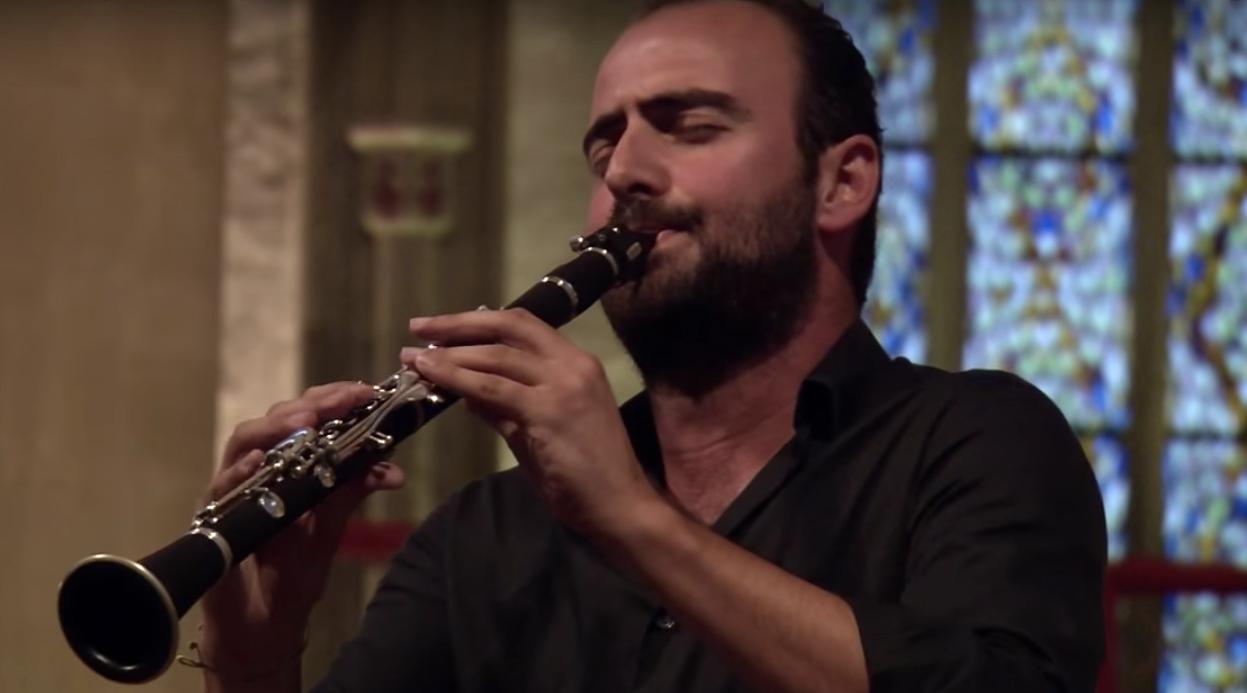This celebrated clarinetist worries Trump’s border rules could bar him from going home to New York
Kinan Azmeh, a Syrian clarinet player who lives in New York, performs at Germany’s Morgenland Festival Osnabrück in 2010.
Update: Clarinet player Kinan Azmeh said on Facebook Thursday that he “made it back to New York.”
A virtuosoSyrian clarinetist who has lived in the US for 16 years is unsure whether he will be allowed to return to his New York home, following President Donald Trump’s executive order barring the entry of citizens from seven Muslim-majority countries.
Kinan Azmeh, 40, has been described as one of Syria’s most celebrated musicians. He is a multi-award-winning composer and a performer in renowned cellist Yo-Yo Ma’s Silkroad ensemble.
When he first heard the news of the travel ban, he had just landed in Beirut, where he is due to finish up his current tour.
“Your initial reaction is: Can that be real? But then your second thought immediately is: Oh God, what does this mean to many, many people,” he said in between rehearsals at a concert hall in Lebanon's capital. “It’s a bit surreal, I have to say.”
Azmeh was living in the US on a student visa until three years ago, when he was granted a green card. He is among thousands who have had their futures thrown into question following the ban.
The new restrictions suspend entry for citizens of Iran, Iraq, Libya, Somalia, Sudan, Syria and Yemen for 90 days. All refugee arrivals are banned for 120 days, and Syrian refugees are banned indefinitely.
Tens of thousands protested across the US in opposition to the order.
Azmeh, who was born in Damascus, performed just last week in Hamburg with Yo-Yo Ma. He is a graduate of The Juilliard School in New York City and earned a doctorate in music from The City University of New York in 2013.
oembed://https%3A//www.youtube.com/watch%3Fv%3DRmN6ss0n-6M%26feature%3Dyoutu.be
He made frequent trips to Damascus before the war in Syria began almost six years ago. But he hasn’t been able to visit since. When the impact of the new US travel restrictions became clearer, Azmeh says his thoughts turned to others who might be affected.
“I’ve always been trying to claim Damascus and New York as homes, but then you realize there are so many obstacles, sometimes one signature can take home away from you.”
There was initial confusion over whether the ban applies to green card holders, who are legal permanent residents in the US. Federal judges have suspended parts of the executive order in several cases around the country, but border agents continue to detain visa and green card holders arriving in the country.
The lack of clarity has caused chaos.
“The language of the executive order does indeed ban all green card holders, because they are inspected as ‘immigrants’ when they return to the United States from a trip abroad,” says William Stock, president of the American Immigration Lawyers Association.
“The EO allowed case-by-case exceptions to the ban, but over the weekend the Customs and Border Protection inspectors around the country were not sure how to make exceptions, so green card holders were detained with other immigrants, nonimmigrants [temporary visa holders] and refugees.”
Stock adds that the head of Homeland Security, John Kelly, released a statement late Sunday that allowed border officers to make a “case-by-case” exception to the ban, unless the government has particular safety concerns about the person.
On Wednesday, White House Press Secretary Sean Spicer told reporters that legal permanent residents no longer need waivers to re-enter the US, but confusion continues over how the order is being applied.
Azmeh is concerned about the prospect of losing his home and his life in the US.
“Things are changing quite fast. The last thing I heard was that I might be able to board a plane — even though lots of people were actually denied — but then I’ll have the risk of not being able to enter on the other side. So I don’t know,” he says.
Azmeh says he is used to holdups at airports due to his Syrian passport. He moved to New York a week before 9/11.
“Every time I land in JFK I am singled out as a Syrian passport holder. And held for questioning,” he says.
It happened so much that he composed a piece about the experience, called “Airports.”
oembed://https%3A//www.youtube.com/watch%3Fv%3DiPd6nKCq2Vo
“I decided to use my time in that room creatively,” he says.
“I was thinking this kind of protest song, that people can be united by it, sitting in that room for additional questioning. Because you cannot use your phone, you cannot do anything in there.
“And it’s sad for me to realize that actually this song is still valid 12 years later.”
Azmeh will attempt to fly to the US on Thursday. He is trying not to think about what will happen if he is unsuccessful.
“I keep holding on to the optimist in me. And I feel at home having my clarinet,” he says. “It sounds like a cliché, I know. But I feel empowered by playing music. And I feel at home when I play music. So in that sense, I am not allowing negative thoughts and anxiety to direct my way. And I think the right thing has to happen at some point.”
We want to hear your feedback so we can keep improving our website, theworld.org. Please fill out this quick survey and let us know your thoughts (your answers will be anonymous). Thanks for your time!
